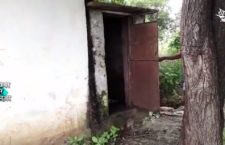Premnarayan Rajput is the son of Ramkali, the Pradhan of Baraimanpur village in Mahua block of Banda in Uttar Pradesh. Without caution perhaps, he admitted something that not many panchayat officials/representatives of Banda would do – “They ‘got us’ to give ourselves an ODF (Open Defecation Free) title, though there are around 250 toilets that needed to be made. Only 75 have been constructed so far.” When asked how this was possible he said it had to be done, under pressure from block level officials. What he didn’t admit or didn’t think important to admit was that all the Valmiki households in the village, around 30 households, have not had toilets constructed. Munnalal Jamadar, one of the residents of the Valmiki basti, reported that when they raised the issue with the Pradhan, he said that toilets for them would be allotted ‘separately’ later.
These complex dynamics in the ground-level implementation of the Central government’s Swacch Bharat Abhiyan (SBA) scheme is not news, in Banda, or the state of UP.
The SBA scheme, flagged off in October 2014 with the stated goal of eliminating open defecation in India by October 2019, celebrates its five-year anniversary this year. This feat, designed to symbolically coincide with Gandhi’s 150th birthday, involves the government claim/international chest puffing that 5.5 lakh villages and 28 of India’s 36 states and union territories have become open defecation-free as of February 2019.
Over the past five years Khabar Lahariya has been reporting everyday realities behind Swachh Bharat and direct harm caused by the urge to label villages and districts ‘Open Defecation Free’: deliberate exclusion of minority, Dalit and economically backward communities, social shunning of those very same families for tarnishing a village’s ‘ODF’ titles; and the pressure and subsequent misuse of power by the authorities in the implementation of the scheme, from the village Pradhan, to district magistrates.
In the build-up to this much celebrated anniversary, and as our own culmination of a long-drawn reportage of this campaign, we visited two villages including Baramainpur village and Bhav Khedi village in Shivpuri, Madhya Pradesh.
On 25th September, in BhavKhedi village, Manoj Valmik’s two children aged 12 and 10 were murdered by a village resident while they went to the fields to relieve themselves. Manoj also reported that his children had been harassed before in the same circumstances. With a significant anniversary approaching, this story harnessed media and administration attention that perhaps it would not otherwise have been lucky enough to get. Reportage majorly focused on the chronological details of the incident and verifying the contradictory claims of the village populace.
The crux of the issue, and the media and administration’s blatant refusal or inability to understand it, is older than the time of Gandhi .Manoj’s household, is the only one belonging to the Valmik community in the village (apart from his father’s home). The question of why they do not have a toilet and why his children had to practice ODF in an open space right next to the Panchayat Bhwan remains unanswered. Like most upper-caste panchayat officals ,Suraj Singh Yadav, the Pradhan deflected attention from the story saying, “It is an unfortunate incident.’Their’ children are like our children. But the fact is that the man who committed the murder was ‘mental’ and had been in the ‘mental hospital’ for years.” Aditya, a local, reported that the family’s situation is still in danger – “The upper caste communities are saying that they could murder the rest of the family to takeover their plot of land of 1 bigha.”
Baijnath Singh Yadav, the district head of the Congress party in Shivpuri, also sought to play down the incident by narrating a list of compensatory benefits that have been issued to the victim’s family.
While villagers and authorities raise allegations and counter allegations regarding the veracity of the concerned family’s claims of murder, and seek to play down its seriousness, one forgets that it was essentially the murder of two children who were deliberately denied access to sanitation. Manoj Valmiki and his community continue, to clean the common refuse of the village, while being denied access to basic rights. The Swacch Bharat Abhiyan may build its strenght and impact on the premise of the number of toilets built , the fact remains that it was built on the labor of Dalits who continue to build and clean toilets and their refuse while being denied their basic rights to sanitation.

